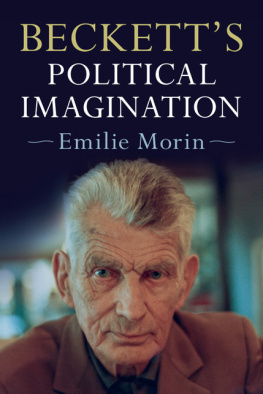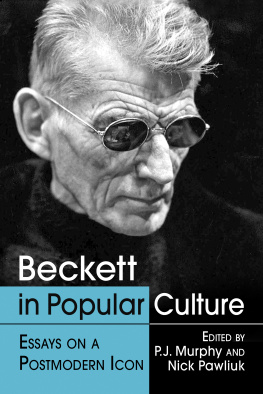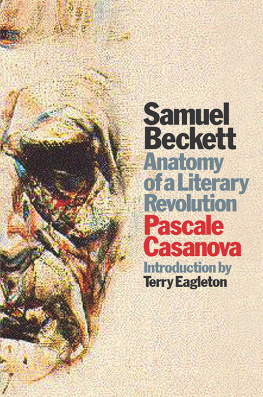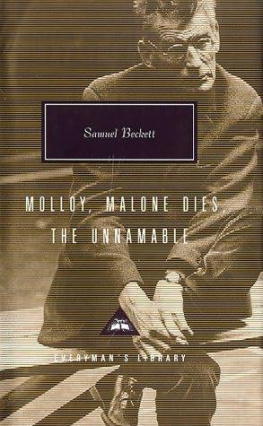Beckett Dantes

To Ruby Cohn, Carla Locatelli,
and John Pilling,
my buoni maestri
Becketts Dantes
Intertextuality in the fiction and criticism
DANIELA CASELLI

Copyright Daniela Caselli 2005
The right of Daniela Caselli to be identified as the author of this work
has been asserted by her in accordance with the Copyright, Designs and Patents Act 1988.
Published by Manchester University Press
Oxford Road, Manchester M13 9NR, UK
and Room 400, 175 Fifth Avenue, New York, NY 10010, USA
www.manchesteruniversitypress.co.uk
Distributed exclusively in the USA by
Palgrave, 175 Fifth Avenue, New York,
NY 10010, USA
Distributed exclusively in Canada by
UBC Press, University of British Columbia, 2029 West Mall,
Vancouver, BC, Canada V6T 1Z2
British Library Cataloguing-in-Publication Data
A catalogue record for this book is available from the British Library
Library of Congress Cataloging-in-Publication Data applied for
ISBN 978 0 7190 7156 0
First published 2005
14 13 12 11 10 09 08 07 06 05 10 9 8 7 6 5 4 3 2 1
Typeset by
D R Bungay Associates, Burghfield, Berks
Printed in Great Britain
by CPI, Bath
Contents
Acknowledgements
Many people have contributed to the making of this book. Carla Locatelli first kindled my enthusiasm for Beckett, and her inquisitive mind has never stopped being a source of inspiration. I am grateful to John Pilling for sharing with me some of his staggering knowledge of Beckett, and for his academic thoroughness, high standards, and witty criticism, which have taught me a lot over the years. Ruby Cohns insight and rigorous scholarship have guided my work, and her friendship and generosity have made it all possible.
I would like to thank the expert staff at the Beckett International Foundation Archive at Reading University Library, and especially Mike Bott and Julian Garforth for their good humour and kindness, and the Library staff at Trinity College Dublin. My gratitude goes to Edward Beckett for granting permission to quote from unpublished material, to James and Elizabeth Knowlson for their help in reading manuscripts, to Zygmunt Baranski for his advice on matters relative to Dante, and to Anna Dolfi for her support over the years.
Instrumental to the writing of this book was the climate of friendship and real intellectual exchange created by Karn Lesnik-Oberstein, Jonathan Bignell, Stephen Thomson, Ciarn OKelly, Sue Walsh, and all the other members of the Cultural and Critical Theory Group at the University of Reading. I am grateful to Jonathan Bignell at the University of Reading and Erica Burman at Manchester Metropolitan University for their generosity and infectious intellectual enthusiasm and to John and Christine Bolland, John Sears, and Patricia Allmer for their advice and help when I most needed it. The School of English, Sociology, Politics and Contemporary History at the University of Salford provided me with a friendly, supportive, and stimulating working environment, which helped me complete this book and plan others.
My gratitude goes to my mother, Maria Luisa Pustetto, and to my father, Fulvio Caselli, for their unfailing support and encouragement to do what I liked most and to stick to it. My sister, Silvia Caselli, has shared joys and anxieties to do with this book and with much else besides, helping me by showing me how integrity, energy, and lightheartedness can work together.
I would also like to thank those friends whose input contributed to the making of this book in so many ways: Mara Zardini, Andrea Pappacena, Gabriele Troilo, Barbara De Rigo, Marisa Basile, Rezzonica Castelbarco, Alberto Ottieri, Peter Buse, Nria Triana-Toribio, Cathy Gelbin, Riccardo Capoferro, Paul Bavister, Laura Hubner, Kaye Mitchell, and Laura Salisbury.
This book could not have been written without Karn Lesnik-Oberstein, an intellectual companion who constantly stretches my thinking and reminds me what scholarship is really about, and a great friend who has always been there for me.
To Emanuele Basile goes my love.
Introduction
There were no pictures on the wall, no obvious amenities, only a narrow bed, a desk and a table with several books, including a dictionary. In the midst of this spare impersonal setting, a single object seemed to stand on its own. One book lay open on the table, close enough so that Gussow could see the notations in the margin. This book was, Beckett told him, his schoolboy copy
Dante is a strange object in Beckett studies; it stands out and stands for Becketts greatness and isolation. This single object breaks the disquieting impersonality of the setting; it evokes a nostalgia for times gone by, and it confirms the intellectual rigour of the author. Dantes presence is pervasive in Beckett studies. The student edition of the Comedy appears Most importantly, however, references to Dante and the Comedy are scattered throughout the Beckett oeuvre.
But what does Dante do in Beckett and for Beckett? This book hopes to answer these questions by arguing that Dantes presence in Beckett is part of a critique of value and authority. Quotation, source, works.
Many critics have isolated fragments of Dantes texts in Becketts oeuvre.
In Beckett, the retrieval of the source (in this study finding references to specific passages from Dante) does not produce, as Michael Riffaterre would have it, a stable picture of the text. fourteenth-and fifteenth-century commentaries) parallel at intertextual level the assertion that there is no real Belacqua (121). Rather than explaining quirky Belacqua Shuah away, Dantes Belacqua adds to his literariness while taking away from his realism.
derives its coherence from its author, as previous readings of the Beckett/Dante relationship have done, Becketts Dantes will demonstrate that Mr Beckett as the authority behind the texts is produced by repetitions, echoes, and what Molloy calls dj vu infinitely beyond my reach (103). Dante is one of the main actors in Becketts theatre of authority.
Authority is thus a crucial issue
The issue can be developed further by looking at Dante as a function within Becketts texts, asking why Dante is present in Beckett as source, quotation, or origin. Within the larger issue in Beckett of where meaning comes from, and if it indeed comes from anywhere, the insertion of Dante in whatever way it occurs simultaneously evokes and critiques this very strategy. Two questions follow: first, how does Beckett criticism deal with the notion of a Dantean intertext, and how might this be reformulated, taking into account the complex ways in which quotation, source, and origin operate in Beckett? And, secondly, how might Becketts texts be read in the light of this different theoretical framework?
Approaches focused on quantifying how much Dante can be found in Beckett, or on determining how accurate or illuminating Becketts representations of Dante may be, are discouraged by Becketts texts themselves, since such questions imply the assumption of literary value, hierarchy, authority, and canon. Instead, these notions are challenged by Becketts prose works, which, by questioning the teleological and authorial implications of narrative, construct different Dantes. In turn, Dantes texts, and mainly the
Next page







